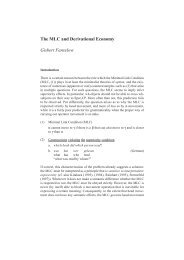Long distance object agreement, restructuring and anti ...
Long distance object agreement, restructuring and anti ...
Long distance object agreement, restructuring and anti ...
Create successful ePaper yourself
Turn your PDF publications into a flip-book with our unique Google optimized e-Paper software.
Bobaljik <strong>and</strong> Wurmbr<strong>and</strong><br />
(10) The (verbal) complement to a lexical verb constitutes a phase (for AGREE),<br />
regardless of its structural size. 6<br />
While CP <strong>and</strong> vP are inherent phases, VP constitutes a phase (by (10)), when it is the<br />
complement of a lexical verb (as in lexical <strong>restructuring</strong> configurations), but not when it<br />
is the complement of a functional head, such as TP or vP (i.e., in simple clauses). We will<br />
refer to the VP complements of lexical verbs as induced phases. We do not, at this point,<br />
underst<strong>and</strong> why (10) should hold. However, recognizing that it does hold makes the<br />
correct cut in the analysis of <strong>anti</strong>-reconstruction effects as demonstrated above.<br />
3. Object Agreement <strong>and</strong> Restructuring<br />
In the previous section, we have provided an account of the distribution of <strong>agreement</strong> <strong>and</strong><br />
nominative case in German long passive <strong>and</strong> long unaccusative constructions. Two<br />
salient aspects of that account were (i) NOM/agr in the matrix clause is fed by a step of<br />
long A-movement, <strong>and</strong> (ii) this movement can not reconstruct. Movement is required<br />
since the lower VP is an (induced) phase boundary, <strong>and</strong> the <strong>anti</strong>-reconstruction effect is a<br />
direct consequence of the LF-phasemate condition on <strong>agreement</strong>. The account should<br />
extend to accusative case assignment in an active <strong>restructuring</strong> configuration as in (5a),<br />
<strong>and</strong> the appearance of the <strong>anti</strong>-reconstruction effect in <strong>restructuring</strong> examples such as (4)<br />
suggests that it does. The active cases are complicated, though, by the fact that lexical<br />
<strong>restructuring</strong> verbs are typically also compatible with non-<strong>restructuring</strong> infinitival<br />
complements, which provide an alternate source for accusative case.<br />
This complication can be avoided by looking at LDA. We have suggested that<br />
accusative case <strong>and</strong> morphological <strong>object</strong> <strong>agreement</strong> reflect the same abstract<br />
relationship, i.e., feature checking/licensing with v. The analysis discussed above thus<br />
makes a set of interrelated predictions. First, apparent “cross-clausal” <strong>object</strong> <strong>agreement</strong><br />
should be possible in <strong>restructuring</strong> configurations. This would constitute exactly the same<br />
structural configuration as (9)a. Second, when <strong>agreement</strong> is manifest, <strong>anti</strong>-reconstruction<br />
effects should emerge, just as they do in German <strong>and</strong> Japanese.<br />
The complement of a lexical <strong>restructuring</strong> verb should constitute an induced<br />
phase, <strong>and</strong> hence long-<strong>distance</strong> <strong>object</strong> <strong>agreement</strong> should not be possible without prior<br />
movement (possibly covert, as in German). Such movement will be obligatory (since the<br />
<strong>object</strong> is not licensed in the RI) <strong>and</strong> will not be able to reconstruct, as it must remain a<br />
phasemate with the higher v at LF. Observationally, the obligatory nature of the<br />
movement may be obscured in the same way that the obligatory case relation is obscured<br />
in German, namely, by the possibility for a lexical <strong>restructuring</strong> verb to combine with a<br />
bigger, non-<strong>restructuring</strong> infinitive. However, in a language with morphological <strong>object</strong><br />
6 The qualification “verbal” is included here simply to remain agnostic as to whether a DP<br />
complement to a verb constitutes a phase boundary. We will return to truncated clausal complements in<br />
section 4. It is tempting to suggest an alternative formulation, for example, that the top of the extended<br />
projection (cf. Grimshaw 1991) of a given lexical verb constitutes a phase. This too, would have the desired<br />
effect that a VP is a phase when it is selected by a lexical head, but not when it is selected by a functional<br />
head. It is not clear to us that this will work for example, for passive, hence we keep to the formulation in<br />
the text. Note also that it is only induced phases (i.e., those defined by (10)) for which we have evidence<br />
that AGREE obeys stricter locality conditions than MOVE. We have not explored the significance of this<br />
observation.

















